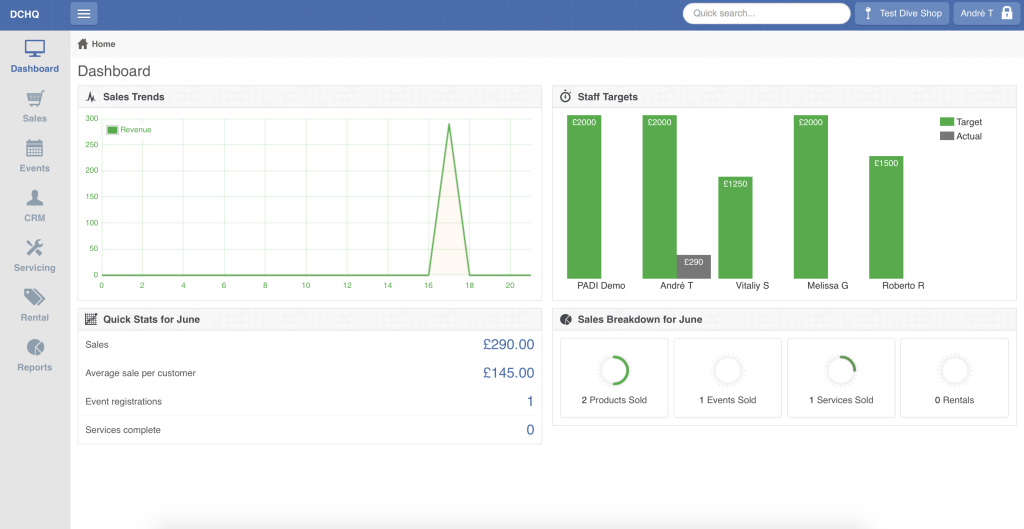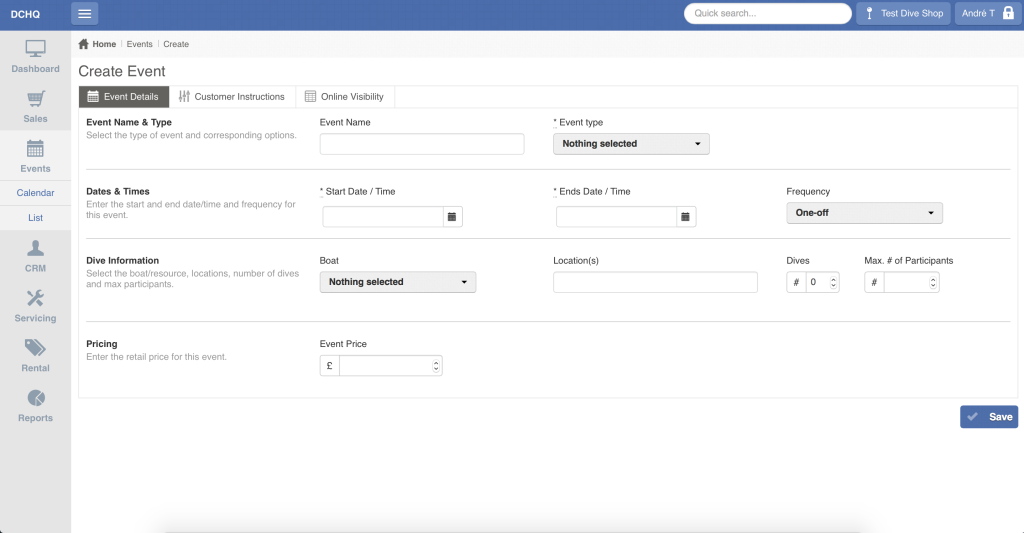Dive-business solution aims to be the all-in-one solution for dive centers
Point-of-sale services
Most dive shops currently have some solution for point-of-sale services. DCHQ is meant to be the system interface, wherein the dive-shop staff can handle equipment sales and other services, such as courses and trips, and accept payment. DCHQ partners with mobile payment service iZettle, which allows a shop to take payment from all major credit cards on small units that attach to smartphones and tablet computers — this means no more asking divers for cash when they show up for dive trips or postponing payment until the dive party returns to the shop. Payment data is transferred using mobile broadband, and if no connection is available, the system simply stores the payment on the device and sends it off for verification once there’s a connection. Updates are live, so if a shop has several payment points (several shops, or a shop but also mobile payment for trips, etc.), the shop manager can monitor payments as they are made. This eliminates the need for dive guides to return to the shop at the end of the day to report earnings, etc.

Sales
This is the storefront portion, and allows the shop to track and create invoices for customers and record all sales for their accounting purposes. The system integrates with the accounting platform Xero, and automatically updates it when the till is closed for the day. Through the available API, DCHQ can even integrate with any storage management system the shop uses, so any item sold in the sales interface is automatically reduced by the correct number in the storage database (and on any web shop the shop may have, if their backend supports that).
Event management
Event management allows the shop to create trips and courses, and to handle all signups for these directly in the interface. The shop can add participants to each event from the CRM segment (more to come on that), and even make notes of whether each participant needs rental gear or has their own. From the signup-list, shop managers or tour operators can print a list of participants, or view it from their smartphone.

Rentals
This allows the dive shop to keep tabs on all their rental gear — what’s booked, what’s out of the house at present, what needs to be picked up or handed in, what’s overdue, etc. Through this, the shop always knows exactly how much and what types of rental gear is available at any time.
Service
The Service segment allows the shop to track all customer gear that is serviced, again including booked arrangements to service gear, gear that has been delivered but not yet serviced, gear that’s been serviced and is waiting for pick up, and a history of all service business. Through this, the shop can allocate resources to service, and give more accurate estimates of service times.
CRM
The Customer Relationship Management (CRM) system is essentially what ties it all together. All customers are filed here, including all associated events, sales, services, and rentals. The database ties up with Mailchimp so the shop can seamlessly send out newsletters. The shop can also enter suppliers and staff, making the CRM the shop’s entire stakeholder catalog, accessible from any web-enabled device.
Conclusion
Having worked in both the diving and retail industry, and having worked and taught e-commerce, I’ve seen my fair share of shop management systems. And all in all, this system is about as easy to use as any I’ve ever seen, and more so than most. Because it’s entirely web-based, it doesn’t require expensive hardware updates, runs on existing hardware, and is entirely mobile. The integration with other systems is excellent and well thought out, and the idea of having all of your shop records, sales, events and CRM constantly updated and safely stored so they are not lost in case of a break-in or fire would let me sleep better at night if I was a dive-shop owner. All data is stored in the EU (and in the US when the system launches there) under local laws.
Essentially, the system isn’t necessarily limited to the dive industry, though it is tailored to it. Any industry with a combination of events, sales, rental, and service (such as ski shops, bike shops, etc.) could also use it effectively.
DCHQ partners with iZettle, as mentioned, and generally rolls out where iZettle launches their services. It is currently available in Europe and is planning to launch in the U.S. very soon.

